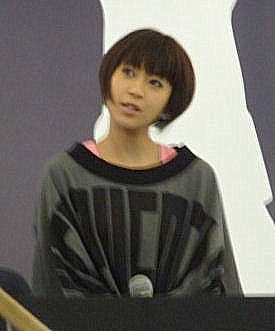
Japanese singer Ayumi Hamasaki has released eighteen studio albums, five compilation albums, twenty-six remix albums, four live albums and numerous singles and promotional singles. She debuted in 1995 under Nippon Columbia with the stage name Ayumi, releasing an extended play Nothing from Nothing, which was a collaboration with Dohzi-T and DJ Bass. Three years later, Hamasaki debuted again as a singer under Avex Trax with the single "Poker Face" (1998). Her first album A Song for ×× (1999) debuted at number one on Oricon's albums chart, and sold over 1.4 million copies.

The discography of Japanese-American R&B and pop singer Hikaru Utada consists of eleven studio albums, three compilation albums, eleven video albums and numerous singles and promotional singles. Utada began as a musician in the early 1990s as a member of U3, a family unit made up of her, her mother Junko Utada, also known as 1970s enka singer Keiko Fuji, and her father, musical producer Teruzane Utada. U3 released their debut album Star in 1993, with the hope to debut in America. In 1996, the group was rebranded as Cubic U, an R&B project focusing on Hikaru Utada, resulting in the English language album Precious in 1998 with record label Toshiba EMI.
The discography of Japanese pop singer Koda Kumi includes 17 studio albums, 2 cover albums, 10 compilation albums, 10 remix albums, 9 live albums and 57 singles. All of her Japanese musical releases have been with Rhythm Zone, a sub-label of Avex Group.

The discography of Namie Amuro contains 12 studio albums, 7 compilation albums, 47 singles, 10 live albums, 14 video albums and 102 music videos. Amuro has also collaborated with Verbal of M-Flo and Ryōsuke Imai for her Suite Chic project.
The discography of Mika Nakashima includes 11 studio albums, 7 compilation albums, 45 singles and 20 video albums. These have all been released through Sony Music Entertainment Japan.
The solo discography of Japanese musician Yui consists of five studio albums, three compilation albums, twenty-one singles and five video albums. These were released on independent label Leaflet Records in 2004, followed by Sony Music Entertainment Japan sub-label Gr8! Records in 2005, Sony Records between 2005 and 2006, Sony sub-label Studioseven Recordings between 2007 and 2010, before returning to Gr8! Records in 2010.
The discography of Japanese contemporary R&B singer Crystal Kay consists of 12 studio albums, three extended plays, five compilation albums, four video albums and numerous single releases. Crystal Kay debuted as a singer at 13 years of age in 1999 under Epic Records Japan. Her third album Almost Seventeen (2002) saw a great leap in popularity for Crystal Kay, reaching number two on Oricon's albums chart. In 2005, Cyrystal Kay sung the eponymous theme song for the Tsuyoshi Kusanagi drama Koi ni Ochitara: Boku no Seikō no Himitsu. "Koi ni Ochitara" became Crystal Kay's most successful single, being certified for a million ringtone downloads.
The discography of Japanese singer Mai Kuraki consists of fifteen studio albums, six compilation albums, twenty-three video albums, three remix albums, fifty-six singles, and sixteen promotional singles. Kuraki debuted in 1999, while she was still in high school, through Giza Studio. The label initially marketed Kuraki in the United States under the name Mai K, and released the single "Baby I Like" (1999). However, the single was a commercial failure which prompted the label to send her back to Japan. There, they released her single "Love, Day After Tomorrow", which peaked at number two on the Oricon Singles Chart and was certified million by the Recording Industry Association of Japan (RIAJ). The second single, "Stay by My Side" became her first number one single on the chart. Kuraki's debut album, Delicious Way, topped the Oricon Albums Chart and was certified triple million by the RIAJ.
The discography of Ayaka consists of six studio albums, two compilation albums, a cover album and numerous singles, released through Warner between 2006 and 2009, and through Ayaka's independent label, A Station, from 2012 onwards.

The discography of Japanese pop and electronic dance group Perfume consists of seven studio albums, three compilation albums, twenty-eight singles and six video albums. Forming in 2001, the group debuted as local Hiroshima idols, releasing two singles through the independent Momiji Label. In 2003, the members moved to Tokyo to further their career as idols. Signing with independent label Bee-Hive Records, the group met electronic producer Yasutaka Nakata of the band Capsule, who began to produce their music from 2003 onward.
The discography of Japanese R&B and pop singer Ken Hirai consists of ten studio albums, two compilation albums, one remix album, three cover albums, thirteen video albums and numerous singles and promotional singles. Hirai debuted as a musician under Sony Music Records in 1995 with the single "Precious Junk", but found success five years later with the single "Lakuen" and his third album, The Changing Same.

The discography of Japanese musician Kaela Kimura consists of eleven studio albums, two compilation albums, one cover album, three extended plays, twenty-eight singles and five video albums. She debuted as a musician in 2004 under the label Columbia Music Entertainment, releasing ten albums with the company. In 2013, Kimura released Rock, an album of English language covers under her private label Ela Music. In 2014, Kimura released "Ole! Oh!", her first single under Victor Entertainment.
The discography of Japanese musical act Rip Slyme consists of ten studio albums, four compilation albums, two extended plays, one live album, eight video albums and thirty-three singles. Rip Slyme debuted as an independent act on File Records in 1995, releasing material with them until their major label debut under Warner Music Japan in 2000. The band's second album under Warner, Tokyo Classic (2002) was a commercial success, selling over 1,000,000 copies.
The discography of M-Flo features nine studio albums, nine compilation albums, one live album and 25 singles. These were released on Labsoul Records and Avex Group independent label Rhythm Republic in 1998, and from 1999 onwards released through Rhythm Zone.
The discography of Tokyo Jihen consists of five studio albums, three compilation albums, one regular release extended play and three vinyl exclusive extended plays and 13 video releases, released through Toshiba EMI, EMI Music Japan and Universal between 2004 and 2013.
The discography of Japanese pop duo Dreams Come True consists of 20 studio albums, 6 compilation albums, 17 video albums, and numerous singles. The band was formed in 1988 by Miwa Yoshida, Masato Nakamura, and Takahiro Nishikawa as Cha-Cha & Audrey's Project, which was later changed to Dreams Come True. The first single "Anata ni Aitakute" did not chart, but their eponymous debut album sold over a million copies in Japan and was certified Million by the Recording Industry Association of Japan (RIAJ). The follow up albums also performed well on the charts, with the 1989 release Love Goes On... lingering on the Oricon Albums Chart for four years. The group's fifth studio album The Swinging Star (1992) was at one point, the best-selling album in Japan, shifting over 3.7 million copies in the country.
The discography of Japanese pop and jazz vocalist Juju consists of six studio albums, four tribute albums, two extended plays, two live albums, five video albums and numerous singles. Juju debuted as a singer in 2001, collaborating with artists such as DJ Masterkey, Spontania and worked on the soundtrack for the film Kyōki no Sakura.
The discography of Japanese boy band SMAP consists of 21 studio albums, 5 compilation albums, 23 video albums, and numerous singles. Sports Music Assemble People, abbreviated as SMAP, was formed in 1988 by a group of backup dancers for the boy band Hikaru Genji of Johnny & Associates. The band's initial releases performed poorly on the charts, but the following ones started gaining attention, aided by the group's appearance on their own variety show, SMAP×SMAP. Meanwhile Kimi Iro Omoi single was used in anime Akazukin Chacha broadcast in Japan only. In worldwide broadcast, Kimi Iro Omoi single was replaced by Shoko Sawada. However, that single can only available on MP3 Store, then download between TV Size and Full version. Their 2003 single "Sekai ni Hitotsu Dake no Hana" sold over two million copies in Japan, becoming one of the best-selling singles in the country. In August 2016, the group announced that they will disband by the year end. Since 2003, all of the band's releases have peaked at number one on the Oricon Albums or Singles Chart. The group has sold over 38,5 million records in Japan.
The discography of Japanese singer-songwriter Kazumasa Oda consists of ten studio albums, four compilation albums, two cover albums, three video albums, and thirty solo singles. Oda began his career as a performer of the folk-rock band Off Course. He began releasing solo material in 1985. His 1991 single "Oh! Yeah!" / "Love Story wa Totsuzen ni" topped the Oricon Singles Chart and was certified two-times million by the Recording Industry Association of Japan (RIAJ). When his 2016 compilation album Ano Hi Ano Toki topped the Oricon Albums Chart, Oda became the oldest artist in the country to achieve the accomplishment.

The discography of the Japanese pop group Sandaime J Soul Brothers consists of eight studio albums, two compilation albums, and twenty-six singles. Since the group's original formation in 1999, the group has experienced two line-up changes and reboots, and currently consists of seven members: Naoto Kataoka, Naoki Kobayashi, Ryuji Imaichi, Hiroomi Tosaka, Elly, Takanori Iwata, Kenjiro Yamashita. The group was formed by producer and former Exile member Hiroyuki Igarashi who founded the group's management agency LDH Japan.






